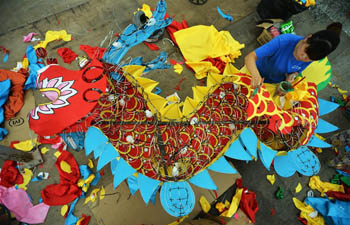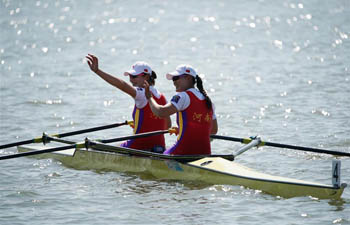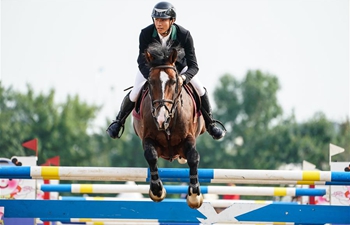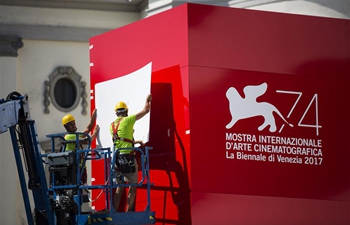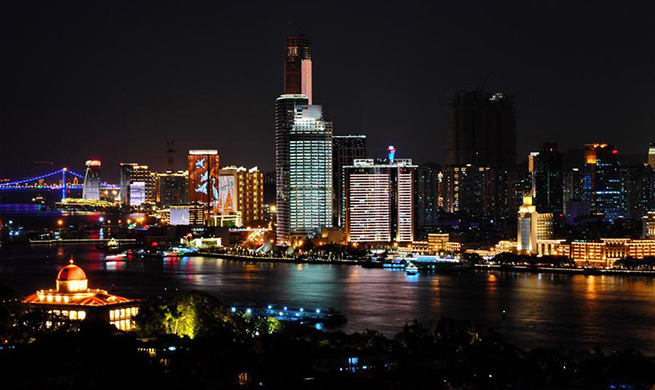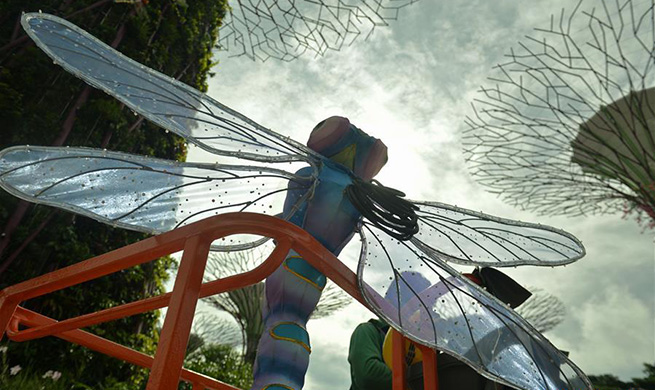BEIJING/YINCHUAN, Aug. 30 (Xinhua) -- A two-year international winemakers contest, organized by northwest China's Ningxia Hui Autonomous Region, came to its conclusion on Tuesday evening in Beijing.
Five winemakers, from South Africa, Sweden, Australia, United Kingdom and the United States, won gold medals and a cash award of 100,000 yuan (15,000 U.S. dollars) each.
Another 10 were awarded silver medals and 20,000 yuan each.
FILLED WITH PERSONALITY
The Ningxia Winemakers Challenge featured 48 winemakers from 17 countries who visited the Helan Mountain area in Ningxia in September 2015.
Each candidate was randomly paired with a local winery, received three hectares of grapes in a vineyard and made a Cabernet for the competition.
The event was organized by International Federation of Vine and Wine of Helan Mountain's East Foothills, and supported by the regional bureau of grape industry development.
A similar contest was organized in 2012, with seven international winemakers.
Located between 37 and 40 degrees north latitude, the area is ideal for vineyards.
Hao Linhai, chairman of the federation, said the sandy soil, abundant sunshine and wind shielding by the mountain made Helan Mountain region a perfect place for making wine.
An expert panel, led by Ma Huiqin of China Agricultural University and Andrew Caillard, founder of Langton's wine auction house and a highly-regarded judge of international wine contests, assessed the wines on Tuesday and chose the winners.
Ma said the contest was a perfect platform for exchange among Chinese and foreign winemakers, which would inspire local winemakers.
"Wine making is like fashion design and writing. You are not likely to make good wine without communicating with others," she said.
Via this contest, various skills of people from different countries will help local wines form diverse "personalities," said Chinese winemaker Deng Zhongxiang, 33. After graduating from the wine school of University of Burgundy in 2012, Deng became a wine consultant in Ningxia.
Foreigners were more skilled with technology and in processes such as the fermentation and ageing time, skills which must be learned by domestic winemakers, said Deng.
However, he worries that foreigners may not get the "character" of local grapes so well, as they were not so familiar with the climate and grape varieties in Ningxia.
"The other day, a French winemaker asked me when the grapes should be harvested here this year," he said, adding the harvesting in the region is generally later than overseas.
With the extensive communication and exchange, the gaps between Chinese and foreign winemakers will gradually be narrowed, Deng believes.
WINERY TOURISM
Ningxia has about 40,000 hectares of vineyard, about a third of the area cultivated in Bordeaux.
Instead of building famous wine brands for the market, the region has focused on winery tourism. Nearly 200 wineries have been or are being built, with 120,000 people employed and 350,000 tourists received in 2016, according to the bureau of grape industry development of Ningxia.
The region will have a cultural center for wine, 10 resort townships featuring grapes and wine, and more than 100 column-level wineries by 2020.
A column-level winery has to own vines more than five years old and produce a grape yield between 7.5 to 12 tonnes per hectare, with other factors evaluated, such as reception capacity and sommeliers.
"I expect to turn my vineyard into a compound of countryside and recreation for wine lovers from around the world," said Yuan Hui, owner of a vineyard with a Han Dynasty (202 B.C. - 220 A.D.) theme.
Ningxia has added a new choice for foreign tourists, although wineries alone are far from enough to attract tourists, said Philipp Jorg, a judge of the contest and founder of German consultancy Degustar, who visited 70 wineries in Ningxia Last year.
"Like Bordeaux with its history, coastal landscape, and French food, Ningxia needs more that makes people feel it is worthwhile to go there," he said.
Nova Cadamatre, a silver prize winner from the United States, said the winery she was paired with was beautiful with a very traditional Chinese style.
"I highly recommend people go there, it's incredible," she said."It's small, but they focus so much on quality. And that's really what's important."
Cadamatre had intended to attend the first contest in Ningxia in 2012 before she found herself pregnant. Her son will be five years old in October.
"I hope to bring him here next time," she said.





